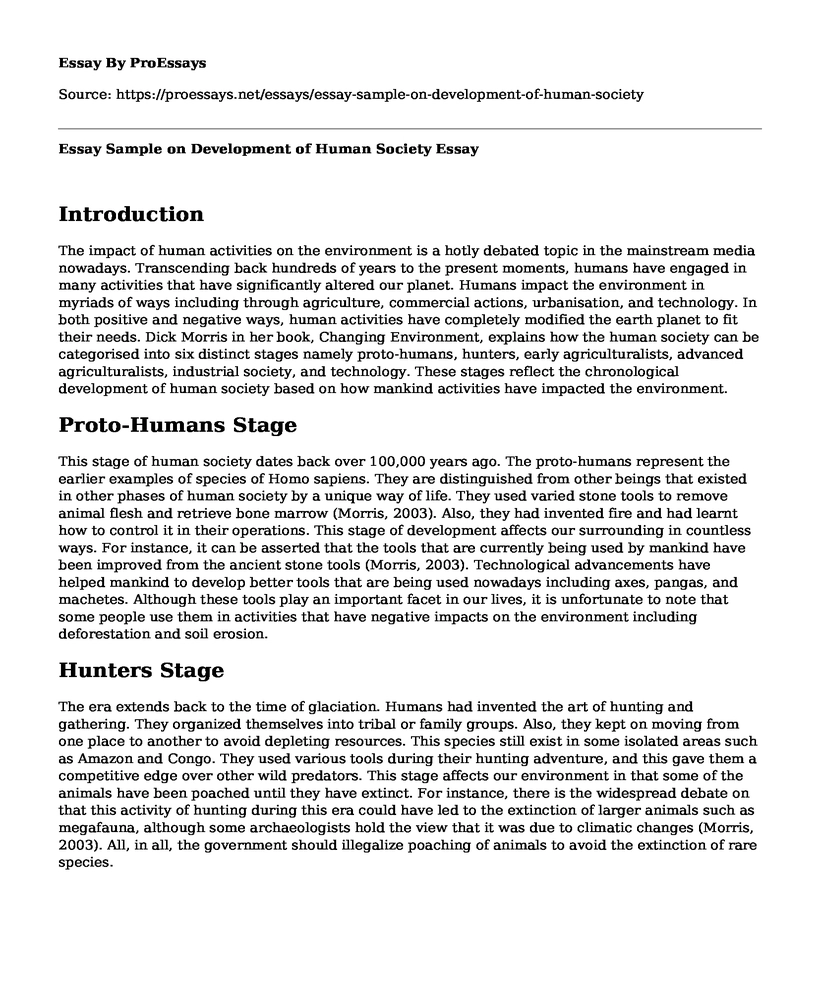Introduction
The impact of human activities on the environment is a hotly debated topic in the mainstream media nowadays. Transcending back hundreds of years to the present moments, humans have engaged in many activities that have significantly altered our planet. Humans impact the environment in myriads of ways including through agriculture, commercial actions, urbanisation, and technology. In both positive and negative ways, human activities have completely modified the earth planet to fit their needs. Dick Morris in her book, Changing Environment, explains how the human society can be categorised into six distinct stages namely proto-humans, hunters, early agriculturalists, advanced agriculturalists, industrial society, and technology. These stages reflect the chronological development of human society based on how mankind activities have impacted the environment.
Proto-Humans Stage
This stage of human society dates back over 100,000 years ago. The proto-humans represent the earlier examples of species of Homo sapiens. They are distinguished from other beings that existed in other phases of human society by a unique way of life. They used varied stone tools to remove animal flesh and retrieve bone marrow (Morris, 2003). Also, they had invented fire and had learnt how to control it in their operations. This stage of development affects our surrounding in countless ways. For instance, it can be asserted that the tools that are currently being used by mankind have been improved from the ancient stone tools (Morris, 2003). Technological advancements have helped mankind to develop better tools that are being used nowadays including axes, pangas, and machetes. Although these tools play an important facet in our lives, it is unfortunate to note that some people use them in activities that have negative impacts on the environment including deforestation and soil erosion.
Hunters Stage
The era extends back to the time of glaciation. Humans had invented the art of hunting and gathering. They organized themselves into tribal or family groups. Also, they kept on moving from one place to another to avoid depleting resources. This species still exist in some isolated areas such as Amazon and Congo. They used various tools during their hunting adventure, and this gave them a competitive edge over other wild predators. This stage affects our environment in that some of the animals have been poached until they have extinct. For instance, there is the widespread debate on that this activity of hunting during this era could have led to the extinction of larger animals such as megafauna, although some archaeologists hold the view that it was due to climatic changes (Morris, 2003). All, in all, the government should illegalize poaching of animals to avoid the extinction of rare species.
Early Agriculturalists
Markedly, this stage of human society is characterized by the domestication of animals and the growing of plants. However, they have settled agriculturalists who used to grow a few food crops. They practised several rituals including worshipping gods to seek good harvests (Morris, 2003). The early agriculturalists formed the cornerstone of today's agricultural activities. For example, they helped in identifying plants that are edible as well as the ones that perform better in given ecological conditions.
Advanced Agriculturalists
This era dated back 2,000 years ago. They used better technologies for farming than their predecessors. Again, they practised large scale farming, including irrigation of rice (Morris, 2003). This stage of human society had-reaching impacts to our environment. Some of the farming methods espoused had negative impacts on the environment such as soil erosion.
Industry Society
The period marked to have started around 300 years ago in the UK with the growth of factories. Initially, the factories were water-powered but later invented the coal-powered steam engines to run the factories (Morris, 2003). The process spread rapidly across the world. Also, more people started moving into urban places. Notably, the use of fossil fuels (coal, gas, and oil) has brought significant pollution effects to our environment.
Technology Stage
This stage of human society represents present-day humans. It is distinguished by increased use of energy. Humans have extended the use of coal fuel to gas for heating and transport (Morris, 2003). Moreover, it is characterized by the growing provision in the use of electricity in running household, agricultural, commercial, and industrial tasks. This era is also characterized by the invention of computers and mobile phones. However, human activities during this phase have intensely affected our environment, especially through pollution, deforestation, and poaching.
References
Morris, D. (2003). Changing Environments. Environment, 46(1), 42.
Cite this page
Essay Sample on Development of Human Society. (2022, Nov 22). Retrieved from https://proessays.net/essays/essay-sample-on-development-of-human-society
If you are the original author of this essay and no longer wish to have it published on the ProEssays website, please click below to request its removal:
- Dissertation on the Correlation Between Generations X, Y and Z and Workplace Engagement
- Vocational Counseling Essay
- Theories of Human Growth and Development Essay Example
- Cognitive Development in Childhood Paper Example
- Essay Sample on Skepticism and the Aquatic Ape Theory
- Essay Example on Marxism: Exploring Social Development and Human Nature
- Big Picture Questions Essay







